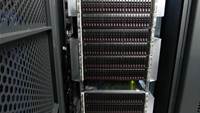Part of Dr Lamont’s challenge is that large multinational service providers such as Schlumberger (French), Fugro (Dutch), CCG Veritas (French) and Ion (US) have slowly bought up Dugeo's competitors and built their own supercomputers.
Those firms now offer heavy-duty reverse time migration algorithms.
“In services, there is good profit margin, but we work really hard for our money,” he said.
The company has responded by using its industry niche to develop software specific to the oil and gas industry.
These niche solutions can sell at up to $100,000 to $200,000 per seat and large organisations take over 100.
Dugeo’s 24 R&D staff are now split between supercomputing services and 3D visualisation software, and the company has opened sales and support offices beyond Perth in Kuala Lumpur, Jakarta, Singapore, Houston, Brisbane and London.
“Software will survive beautifully through a downturn,” Dr Lamont said. “Every month money rolls in. We’ve got a lot of competitors, [but] our software is moving into a more data rich area [pre-stacked data] that the others hadn’t thought to earlier.”
The total market opportunity for this software worldwide is between 50,000 and 80,000 seats, he said.
“We see a big opportunity to sell software in all corners of the world."





_(20).jpg&h=140&w=231&c=1&s=0)
.png&h=140&w=231&c=1&s=0)






 Cyber Resilience Summit
Cyber Resilience Summit
 iTnews Executive Retreat - Security Leaders Edition
iTnews Executive Retreat - Security Leaders Edition
 Huntress + Eftsure Virtual Event -Fighting A New Frontier of Cyber-Fraud: How Leaders Can Work Together
Huntress + Eftsure Virtual Event -Fighting A New Frontier of Cyber-Fraud: How Leaders Can Work Together
 iTnews Cloud Covered Breakfast Summit
iTnews Cloud Covered Breakfast Summit
 Melbourne Cloud & Datacenter Convention 2026
Melbourne Cloud & Datacenter Convention 2026












_(1).jpg&h=140&w=231&c=1&s=0)



